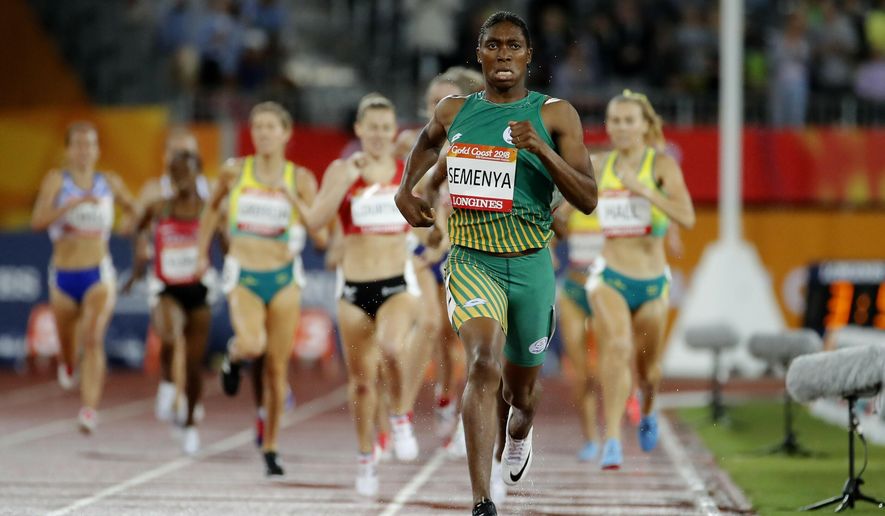All-natural Semenya asked to pay, despite no wrongdoing

By DERON SNYDER (as published in The Washington Times)
Substances and athletic competition go back a long way. For all we know, the ancient Greeks cultivated a mix of “special” olives to help Olympic runners go faster. If nothing else, doping was evident in the 1964 Tokyo Games, when East Germany’s national program began to bear fruit.
Since then, the use of assorted supplements and steroids have occurred in baseball, cycling, football and weightlifting, among other sports. Athletes turn to such regimens because they deliver results in many cases, the same reason governing bodies forbid certain substances.
But Wednesday’s ruling by the Court of Arbitration for Sport could be unprecedented.
CAS didn’t announce a new ban on performance-enhancing drugs. Instead, it issued a mandate for the use of performance-DIMINISHING drugs.
In support of rules imposed by the International Association of Athletics Federations, CAS says South African track star Caster Semenya has done nothing wrong. She just has to lessen her natural state.
Semenya is believed to have an intersex condition, giving her levels of testosterone that are substantially higher than most women. Now, the three-time world champion and two-time Olympic gold medalist must take medication to suppress her testosterone in order to compete.
Eat right and train hard. Work on your form and get proper rest. Develop the single-minded focus and determination of a champion.
And, oh yeah: Ingest these hormones to decrease your edge.
“The majority of the Panel found that, on the basis of evidence submitted by the parties, such discrimination is a necessary, reasonable and proportionate means of achieving the IAAF’s aim of preserving the integrity of female athletics,” CAS said in a news release.
That’s just what we need, more men arguing about the integrity of women’s bodies.
Separating the sexes in athletic competition makes perfect sense due to men’s typical biological advantage in size and strength. But creating sub-categories for women – because some have an edge over others – seems paternalistic and unduly protective.
“Ms. Semenya believes that women like her should be respected and treated as any other athlete,” her layers said in a statement. “As is typically the case across sport, her unique genetic gift should be celebrated, not regulated.”
Indeed, CAS and the IAAF have embarked on a slippery slope. And not just because the rule only applies to the 400-, 800- and 1,500-meter runs, Semenya’s main events.
To comply, athletes must lower their testosterone levels to below 5 nmol/L and maintain that reduced level continuously for at least six months before a competition. I’m sure there’s some science behind it, but why that level and that length of time?
Does it really “level the playing field,” or does it give Semenya’s competitors an unfair advantage? What about potential side effects of hormone treatment that might prove ineffective, anyway?
There’s no dispute that female athletes with higher levels of testosterone can improve their performances. The IAAF claims the difference can be 5 percent or more. There’s obviously reason for concern if a female athlete artificially boosts her testosterone.
But Semenya’s level is a winning lottery ticket.
“Ms. Semenya (or any other female athletes in the same position) hasn’t done anything wrong,” CAS said. “This is not a case about cheating or wrongdoing of any sort. Ms. Semenya is not accused of breaching any rule. Her participation and success in elite female athletics is entirely beyond reproach and she (doesn’t) warrant any personal criticism.”
It’s not her fault. But she’s asked to compensate nonetheless, while others simply enjoy their physical blessings.
Long arms can help a swimmer, but 23-time Olympic gold medalist Michael Phelps wasn’t forced to clip his wingspan. Towering height can help a basketball player, but Central Florida’s 7-foot-6 center Tacko Fall wasn’t required to stunt his growth. Long legs can help a sprinter, but 11-time world champion Usain Bolt wasn’t asked to shorten his stride.
Besides, testosterone alone doesn’t guarantee success.
India’s Dutee Chand was barred from competing in 2014 due to the IAAF’s “eligibility rules for females with hyperandrogenism.” She reportedly was over the limit but she won a legal challenge in a CAS case that preceded Wednesday’s ruling. The victory allowed her to race in the Rio Games … where she finished 59th out of 64 runners in the 100 meters.
I suppose no would care about Semenya if she consistently brought up the rear.
“I know that the IAAF’s regulations have always targeted me specifically,” she said in a statement. “For a decade, the IAAF has tried to slow me down, but this has actually made me stronger. The decision of the CAS will not hold me back. I will once again rise above and continue to inspire young women and athletes in South Africa and around the world.”
But CAS says she can’t do that naturally. Only artificially.
Next up: Holograms cleared to compete against humans!
— Brooklyn-born and Howard-educated, Deron Snyder writes his award-winning column for The Washington Times on Tuesdays and Thursdays. Follow him on Twitter @DeronSnyder.
 Follow
Follow
